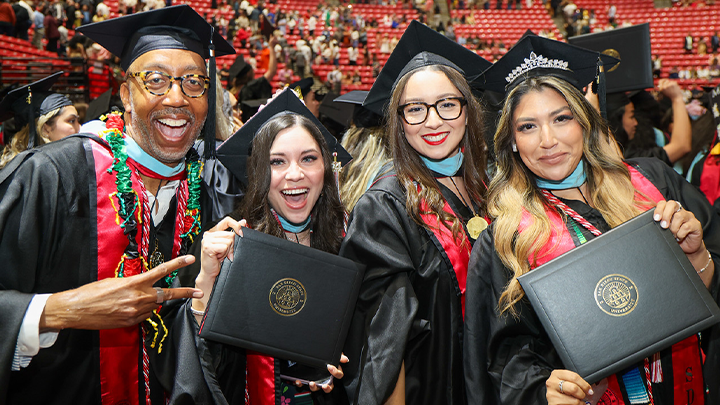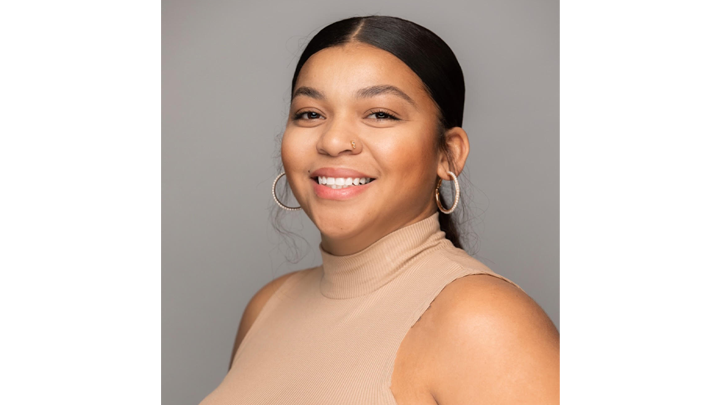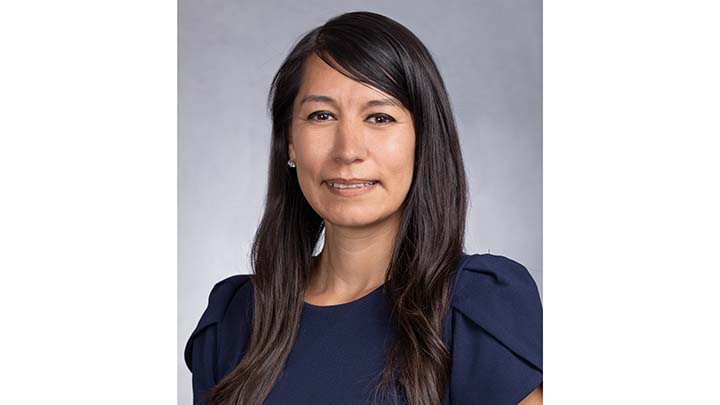Ellen Ochoa and the Multiverse of Motivation
The veteran astronaut returns to her alma mater for a building dedication and another day of inspiring kids to pursue STEM careers.
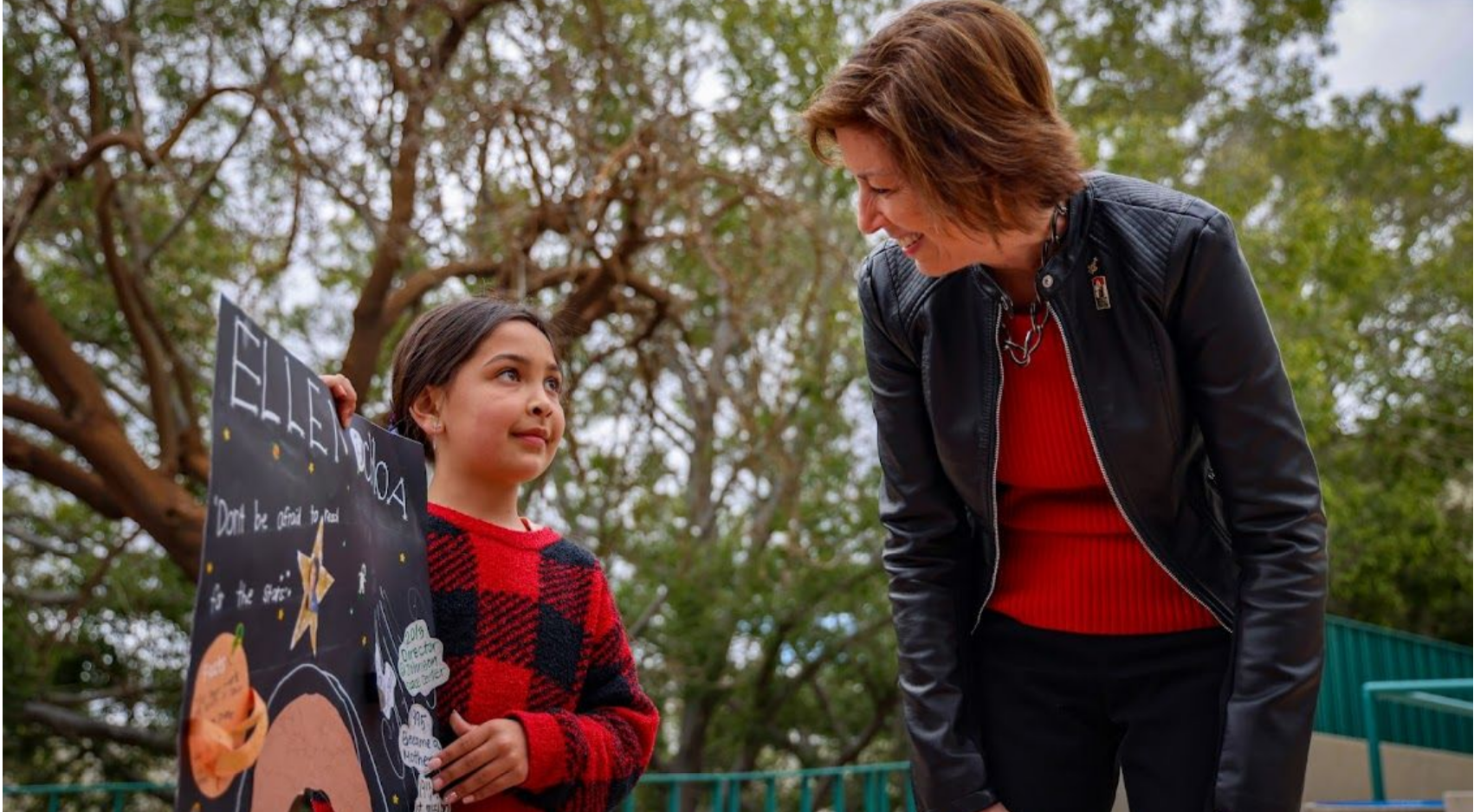
Nearly 30 years to the day after first returning to San Diego State University as an experienced Space Shuttle astronaut, alumna Ellen Ochoa was welcomed back to campus Friday for the dedication of a building bearing her name.
About 300 people, including students and several excited young children brought to the ceremony by a parent, gathered for a ribbon-cutting at Ellen Ochoa Pavilion, formerly West Commons.
“It’s wonderful to be recognized with my name on a building by my alma mater,” said Ochoa, the first Latina to go into space and a former director of the Johnson Space Center in Houston. “And certainly an honor that I could not have imagined when I was a student here.”
Continuing her long-standing and tireless role as an advocate for underrepresented students in science and technology, Ochoa said she still is dedicated to “getting the word out about the rewarding and challenging careers available in STEM fields.”
“Just as others inspired me, I hope that this building will serve to inspire a generation of Aztecs to reach for the stars,” she said.
Ochoa, who grew up in neighboring La Mesa, graduated from SDSU in 1980 with a Bachelor of Science degree. A class schedule brimming with as many as four physics courses at a time — music as the sole respite — helped pave her way to graduate school at Stanford University.
“I honestly don’t think I’d be an astronaut today if I hadn’t gone here,” she said.
SDSU President Adela de la Torre said Ochoa’s accomplishments “have had a tremendous impact on all of us.”
“The Ellen Ochoa Pavilion will serve as a daily reminder to this campus community to pursue their interests (and) passions, regardless of the challenges and obstacles that stand in their way,” said de la Torre.
“She is a champion for education. She has used her own success to inspire and fuel the success of generations that follow, in a whole host of fields.”
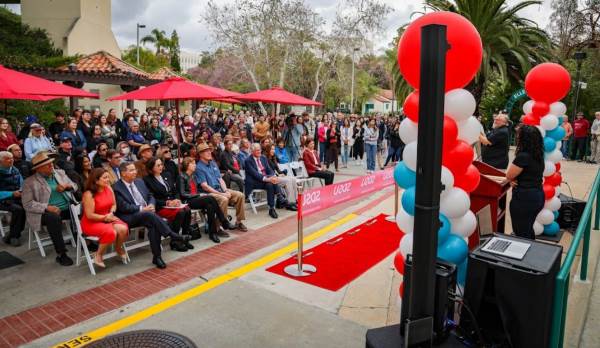
STEM representation
Ochoa visited SDSU on May 11, 1993, just one month after her first trip into orbit on the shuttle Discovery. In a one-hour program with 700 middle and high school students that day, Ochoa shared pictures and videos from her mission. Included was a clip of her in orbit playing a flute, her instrument as a member of the Marching Aztecs and in the Wind Ensemble.
She made three more trips into space on the shuttles Discovery and Atlantis for a total of nearly 1,000 hours. She also kept up a busy schedule of school appearances, promoting the value of educating and encouraging girls in particular to follow her example and pursue careers in STEM fields.
Just Thursday, she revisited a middle school in La Mesa, Parkway Sports & Health Science Academy, which she attended as a child, for the dedication of a mural bearing her image. Parkway Middle School, as it was known at the time, also had been one of her speaking stops 30 years ago.
In an interview with SDSU NewsCenter before the ceremony, Ochoa said some things have changed over those three decades, while others haven’t.
Despite this increasingly routine nature of space travel, she said, young people still are “just really excited whenever I talk, anywhere around the country, about space.”
It’s true.
“I love astronauts,” said 7-year-old Annalies Naluz, who is writing a report on Ochoa for her class at Hickman Elementary School in Tierrasanta and got to have a picture taken with her subject.
Naomi Webb, who is transferring from San Diego City College to SDSU’s aerospace engineering program in the fall, was also thrilled by the chance to see the guest of honor. “I think Ellen Ochoa is really inspiring,” Webb said. “I want to be the second astronaut to graduate from here.”
That kind of talk elates Ochoa.
“Diversity has increased in the STEM fields but not nearly as I would have predicted 30 years ago (for) what it would look like today,” Ochoa said during her interview. “I think there’s a lot more voices talking about it now and more opportunities for kids to have at least some kind of experience when they’re younger.”
But when some of them think about a “scientist,” she said, “they’re not picturing themselves or somebody who looks like them.”
To help change that, Ochoa last year wrote “Dr. Ochoa’s Stellar World: We Are All Scientists/Todos Somos Científicos” (2022, Lil’ Libros), first in a planned series of bilingual board books for pre-K children on STEAM fields. The next volumes, due in the fall, will touch on the next two letters of the acronym: technology and engineering.
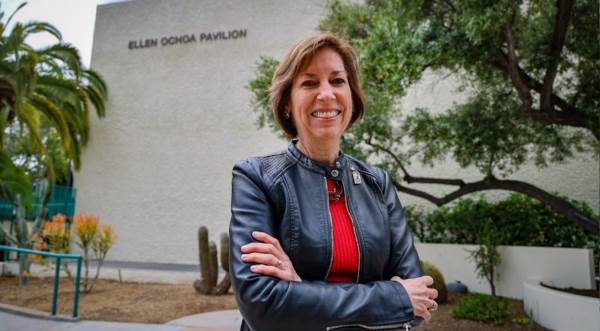
New audience
In the plethora of astronaut books since NASA’s Mercury program, Ochoa’s may be the first one aimed at a preliterate audience. Ochoa said she was approached to write it by a publisher specializing in bilingual children’s books. The result is a book describing scientists as investigators driven by curiosity, illustrated very noticeably with a racially diverse population of boys and girls.
Planning what to convey in the book, “I just had to think about, what do I wish I had known about science when I was young,” said Ochoa.
Public appearances have traditionally been part of an active astronaut’s job duties, and Ochoa said the fact that she was on the road barely a month after her first flight was partly because the school year was nearly over. (Her most recent previous visit to SDSU was in October 2019, when she was awarded an honorary doctorate but also spoke to hundreds of university and public-school students.)
What keeps her going 30 years later, she said, is the thought that “it’s really important to do. We need people to study STEM in our country and there are a lot of groups that really aren’t well-represented at all, so we’re missing out on a lot of right minds, a lot of people who could ask good questions or come up with good solutions to challenges.
“Oftentimes, nobody has really talked to them about it.”
In February Ochoa joined the board of directors of SRI International, a nonprofit research institute founded in 1946 by her other alma mater, Stanford University. “I’ve been involved in research or engineering or technology development really throughout my career,” she said. “That’s exactly what they do at SRI. … That’s something I wanted to stay involved with.
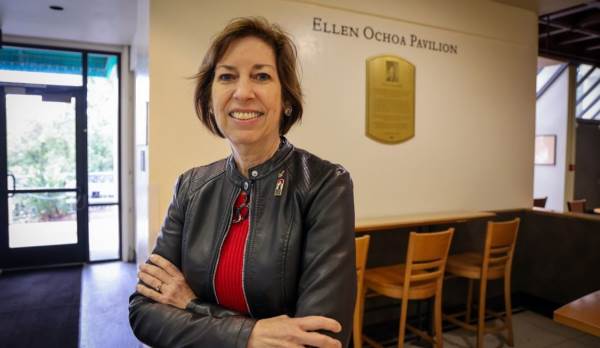
Ellen Ochoa is photographed inside the Ellen Ochoa Pavilion, formerly West Commons, at SDSU, May 5, 2023. (Rachel Crawford / SDSU)
More firsts
Ochoa’s status as a prominent “first” in the astronaut corps is being replicated by others today in the announcement of a maiden crew for NASA’s Artemis program, which will send astronauts back to the moon for the first time since Apollo 17 in 1972. It includes the first woman and first Black person to be sent into lunar orbit.
NASA’s astronaut corps “is just more representative of the American population,” Ochoa said in the interview. And she hopes that helps young people understand they can think big and set high goals for themselves, even if it doesn’t involve going into space.
Ochoa’s husband, Coe Miles, attended the ceremony along with two brothers, Wilson and Monte Ochoa, and extended family members.
The newly renamed, two-story structure is an SDSU potpourri, comprising classrooms, a food sciences lab, some eateries, a bank and the Native Resource Center.
Friday’s dedication was the second of two renamings of SDSU buildings this spring. In April, a ceremony was held at the Charles B. Bell Jr. Pavilion (formerly East Commons), honoring a mathematics and statistics professor who was the first Black faculty member to achieve tenure.
Both renamings are the product of a presidential task force and a campuswide invitation for nominations intending to increase representation for diverse communities across campus.

